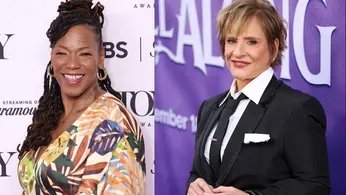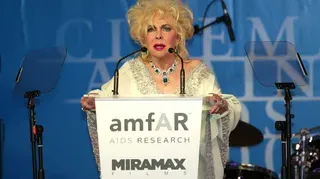
November 4, 2024
Broadway Snafu Gets Personal – 'Hell's Kitchen' Star Kecia Lewis Accuses Patti LuPone of Being 'Racially Microaggresive'
READ TIME: 4 MIN.
The Alicia Keyes musical hit "Hell's Kitchen" and the Patti Lupone/Mia Farrow two-hander "The Roommate" are in adjacent Broadway theaters, sharing a back wall. That is the root of a current controversy in which Kecia Lewis, the Tony-winning star of the musical, has called out LuPone for being "racially microaggresive," demanding an apology after LuPone complained the musical is too loud.
Variety reports that Lewis posted a six-minute video on Instagram addressed to Lupone, recounting incidents in the past few weeks related to LuPone's actions, beginning by specifying her comments are hers alone and do not represent any of the "Hell's Kitchen" cast, crew, or producers.
Lewis went on to note "a couple of situations that have gone on in the last few weeks" involving LuPone. "The first one is that you contacted our theater owner about changing a couple of our sound cues because you found them to be too loud," she said. "You also, after our sound design was adjusted, sent flowers to our sound and stage management team thanking them."
The video message then cut to a clip of LuPone refusing to sign a Playbill for "Hell's Kitchen" when approached by a fan outside the theater because the musical is "too loud." Lewis continued: "I wanted to address this because, Ms. LuPone, these actions, in my opinion, are bullying. They're offensive, they are racially microaggressive, they're rude, they're rooted in privilege. And these actions also lack a sense of community and leadership for someone as yourself, who has been in the business as long as you have."
Lewis went on to define "microaggresion." "I want to explain what a microaggression is. These are subtle, unintentional comments or actions that convey stereotypes, biases, or negative assumptions about someone based on their race. Microaggressions can seem harmless or minor, but can accumulate and cause significant stress or discomfort for the recipient. Examples include calling a Black show loud in a way that dismisses it. In our industry, language holds power and shapes perception, often in ways that we may not immediately realize. Referring to a predominantly Black Broadway show as loud can unintentionally reinforce harmful stereotypes, and it also feels dismissive of the artistry and the voices that are being celebrated on stage."
Nor did Lewis consider LuPone sending flowers to the sound and stage management team a cordial gesture, but rather one that was "dismissive and out of touch, especially following a formal complaint that you made that resulted in the changes that impacted our entire production. Primarily the people who have to go out on stage and perform the work were impacted." She called the gesture an example of "bullying," saying "performative gestures are also bullying, and what I mean by that is by sending thank you flowers after impacting the production can be perceived as disingenuous, particularly if it sidesteps meaningful dialog or resolution."
Lewis went on to request collaboration between the two shows, which would mean "direct communication, respect for the work being done, and awareness of how actions resonate across diverse teams." Without it, she claims, LuPone's action appear bullying, and that "bullying in a professional setting can include exerting influence to disrupt using one's status or connections to cause unnecessary changes to someone else's work environment, such as requesting sound adjustments."
"I'd like to offer a couple of thoughtful questions for veterans such as yourself and including myself," Lewis concluded. "How can I ensure that my feedback or my concerns are communicated in a way that is constructive and also, most importantly, respectful? How can I use my platform and experience to support diverse show teams promoting the idea that every production brings unique value to Broadway?"
Lewis concluded the open letter to LuPone by saying, "On Broadway, we are not just neighbors, Ms. LuPone. We are a community that shares in each other's artistry and challenges. Respect and collaboration are what keep us thriving and inspire the next generation. It's important that we support each other's hard work on and off the stage, so let's lift each other up and show that every show on this street called Broadway deserves respect and celebration. Let's continue fostering an environment on Broadway that recognizes and values all shows for their unique contributions and energy, and that celebrates the diversity of voices and sounds and stories that we all bring to the stage. Ms. LuPone, I respectfully submit to you that you owe us an apology – not flowers. Thank you for listening."
Variety said that LuPone declined to comment on Lewis' open letter. The "Roommate" producers said in a statement posted Sunday, "We are grateful to everyone at 'Hell's Kitchen' for adjusting their cues to prevent sound bleed into our theater, which was affecting backstage, onstage and into the audience. On Broadway, these historic buildings were built long before the existence of modern amplification and sit side by side, playhouses sharing walls with musical houses. These kinds of sound accommodations from one show to another are not unusual and are always deeply appreciated. We're proud to share Shubert Alley with 'Hell's Kitchen' and wish our neighbors continued success."







